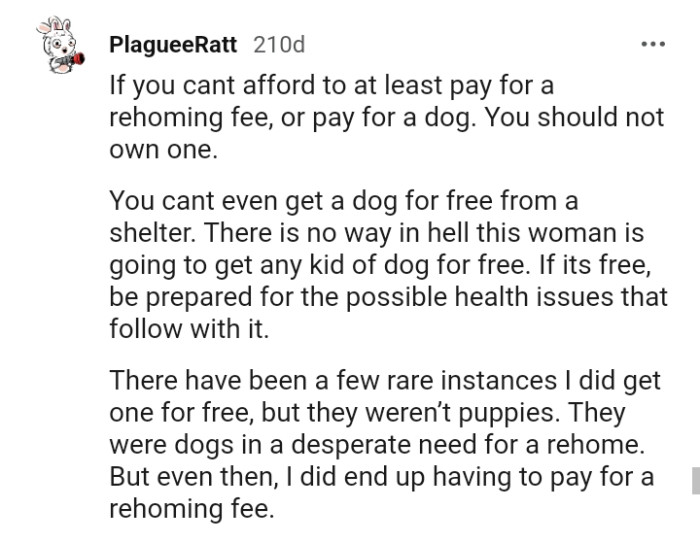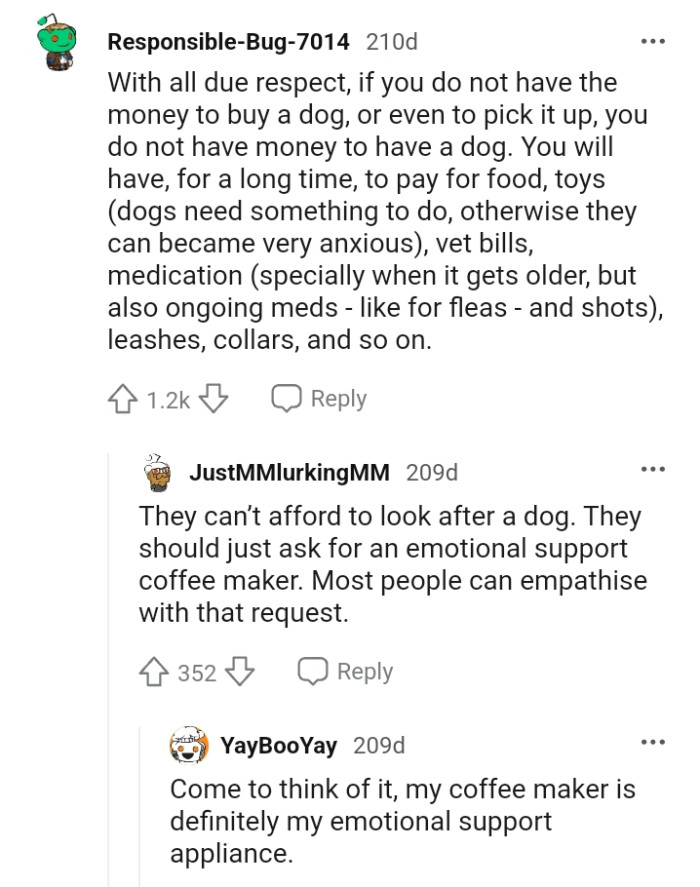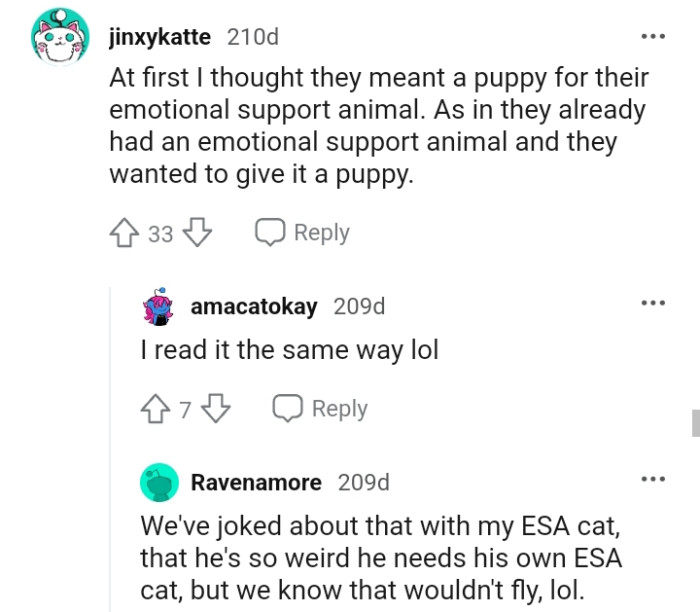Redditor Shares Screenshot Of Someone Looking For A Free Emotional Support Dog, Vacuum Cleaner And Coffee Maker
Animals can bring happiness and company. People who are experiencing emotional difficulties might also benefit emotionally from animals.
These animal friends that have gained popularity in the past several years are called Emotional Support Animals (ESAs). These animals don't have specialized training to carry out duties that help people with disabilities, but they do offer company, reduce loneliness, and occasionally help with sadness, anxiety, and some phobias.
Animals may provide much-needed consolation in trying times and be a positive influence on a bad day. Regarding who would and would not profit from an ESA, there are no hard-and-fast criteria, as the main advantage of spending time with an animal is frequently the simple camaraderie that results from doing so.
Taking care of an animal can be somewhat labor-intensive, depending on the species. This form of accountability may serve as a helpful motivator for certain people to follow routines.
You see, the main reasons people use an emotional support animal are to combat depression or control panic attacks. When an individual is in a difficult circumstance that can impair their ability to function, they can seek solace from an animal.
Dogs are not the only animals that may provide emotional support, but it is the choice of most people, just like the person we see in today's post. A certain Redditor brought a case to the r/ChoosingBeggars subreddit community for them to trash out, and it is right below.
And here lies the screenshot

The Reddit post got hundreds of comments and here are a bunch of them for you to read through below

This person doesn't sound as if they can even walk the dog

Examining the Demand for Free Emotional Support
The phenomenon of seeking free resources, such as emotional support animals, often reflects deeper psychological needs and societal trends.
Dr. Amy Becker, a clinical psychologist, notes that people with unmet emotional needs may attempt to find quick fixes through external means, signaling a lack of understanding regarding the long-term commitment required for emotional support animals.
This behavior can also stem from a reluctance to invest in mental health solutions that may involve more significant emotional labor or financial expense.
Exploring the Psychology of Entitlement
The request for free emotional support animals, household appliances, and other amenities reflects a broader psychological phenomenon known as entitlement. According to Dr. Roy Baumeister's research at Florida State University, entitlement can stem from various factors, including upbringing and societal influences. Individuals who exhibit entitlement often do so because they believe they deserve special treatment without the corresponding effort, which can be rooted in past experiences.
This sense of entitlement can lead to significant interpersonal issues, as it often disregards the needs and contributions of others. In many cases, individuals may not realize their behavior is perceived as lazy or demanding, indicating a potential lack of self-awareness. Addressing these underlying beliefs can lead to healthier interactions and a more balanced perspective on relationships.
This person should just get a stuffed animal

You can't even get a dog for free from a shelter

They can't afford to look after a dog

Studies show that the commodification of emotional support can lead to misunderstandings about the nature of mental health support. According to Dr. Susan David, a renowned psychologist and author, "The responsibility of caring for a living being is often underestimated, which can lead to increased stress and potential neglect." This situation underscores the importance of educating individuals about the true nature of emotional support and the commitment it entails, as emphasized by Dr. Laura Berman, who states, "Emotional support animals require a level of care and attention that many may not be prepared for."
From a developmental perspective, the roots of entitlement can often be traced back to childhood experiences. Research by Dr. Jean Twenge at San Diego State University suggests that children who are excessively praised or shielded from failure may develop unrealistic expectations of their worth in adulthood. These findings underscore the importance of fostering resilience and a strong work ethic in children to mitigate potential issues with entitlement later in life.
In this case, it may be beneficial for individuals to reflect on their upbringing and how their expectations have been shaped over time. Engaging in cognitive restructuring can help them challenge and modify these beliefs, leading to healthier attitudes toward personal responsibility.
A Redditor had this to say
Omg can’t afford even a coffee maker or shots let alone can’t even drive to the vet or hospital if the dog gets sick etc. so I’m fairly sure they can’t afford proper food and care, and thinks they need a damn puppy. They need an emotional support therapist, not a puppy. Can’t even find a ride to pick up the “free” support dog? Just wait until it acts like a puppy and actually requires a lot of time, care, money and support itself rather than just being there to support the owner. What a tool. I’d kinda like to punch this person actually.
They're in it for a long term commitment

This Redditor lists what they spend on their dog

They are totally worth it cos they deserve all the love

Understanding the Psychology of Laziness Labels
The label of 'laziness' can often be a simplistic interpretation of more complex psychological issues, including anxiety, depression, or even socioeconomic factors.
Dr. Michael Chen, a psychologist at Stanford University, indicates that behaviors perceived as lazy often mask deeper struggles with motivation and self-worth.
Addressing these underlying issues through therapy or self-help strategies can lead to more productive behaviors and a healthier mindset.
Practical Solutions for Addressing Entitlement
To combat feelings of entitlement, it's crucial to cultivate gratitude and awareness of others’ contributions. A study published in the Journal of Personality and Social Psychology highlights that practicing gratitude can significantly enhance well-being and counteract feelings of entitlement. Individuals can start by keeping a gratitude journal, where they regularly note things they appreciate in their lives and the people who contribute to their happiness.
Additionally, engaging in volunteer work or acts of kindness can help shift focus away from self-centered desires and foster a greater appreciation for community and collaboration. This shift in perspective can create a more balanced view of one's needs in relation to others.
No one should give anyone a living thing for free

He is so weird that he needs his own emotional support cat

Many Redditors wondered how this person would take care of the dog if they didn't even have as much transport fare to bring the dog over. Some said that if this person can't afford a coffee maker that doesn't cost much, then they can't even afford basic dog food.
What do you think about this weird online request? Drop your thoughts in the comments section below and share them as well.
Furthermore, it’s important to understand the social dynamics at play in such requests. Social psychologist Dr. Robert Cialdini's principles of influence reveal that reciprocity often plays a crucial role in human interactions. When individuals feel that they are receiving something without giving back, it can lead to resentment among peers, as relationships may feel one-sided. Recognizing this dynamic can help individuals understand the importance of mutual exchange in relationships, fostering healthier connections.
Encouraging open discussions about expectations and responsibilities can create a more equitable atmosphere, where everyone feels valued and recognized.
Psychological Analysis
This request for free support animals and household items highlights a common pattern of entitlement that can lead to strained relationships. Such behavior often stems from a lack of awareness about the impact of one's requests on others. Encouraging self-reflection and personal responsibility is essential in addressing these patterns and fostering healthier interactions.
Analysis generated by AI
Analysis & Alternative Approaches
In conclusion, understanding the psychology of entitlement can provide valuable insights into interpersonal relationships and expectations. Studies show that fostering a sense of gratitude and responsibility can counteract entitlement and lead to healthier interactions. By reflecting on personal beliefs and engaging in practices that promote mutual respect, individuals can cultivate more meaningful connections with others.
Encouraging individuals to reflect on their motivations behind seeking free resources can foster better understanding and personal growth.
Experts recommend journaling or engaging in therapy to explore the reasons behind these behaviors, which can help individuals connect their actions to deeper emotional needs.
Research indicates that self-reflection is a critical component of personal development and can lead to healthier decision-making in various aspects of life.
Psychological Analysis
This behavior reflects a broader trend where individuals seek quick solutions to complex emotional needs, often overlooking the dedication required for meaningful support systems.
It's essential to understand that these patterns are typically rooted in underlying psychological struggles that deserve attention and care.
Analysis generated by AI
Analysis & Alternative Approaches
Psychological insights reveal that the drive for free emotional resources often stems from more profound issues related to self-worth and understanding of mental health.
According to studies in mental health frameworks, addressing these psychological needs through adequate education and support can lead to healthier relationships with ourselves and others.
Ultimately, fostering awareness and understanding can help individuals make more informed choices about their emotional well-being.



